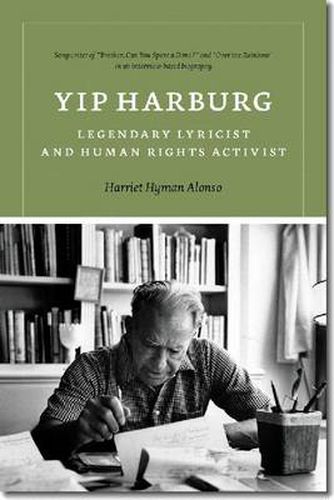Readings Newsletter
Become a Readings Member to make your shopping experience even easier.
Sign in or sign up for free!
You’re not far away from qualifying for FREE standard shipping within Australia
You’ve qualified for FREE standard shipping within Australia
The cart is loading…






Known as Broadway’s social conscience, E. Y. Harburg (1896-1981) wrote the lyrics to the standards, Brother, Can You Spare a Dime?,
April in Paris, and It’s Only a Paper Moon, as well as all of the songs in The Wizard of Oz, including Over the Rainbow. Harburg always included a strong social and political component to his work, fighting racism, poverty, and war. Interweaving close to fifty interviews (most of them previously unpublished), over forty lyrics, and a number of Harburg’s poems, Harriet Hyman Alonso enables Harburg to talk about his life and work. He tells of his early childhood on the Lower East Side of Manhattan, his public school education, how the Great Depression opened the way to writing lyrics, and his work on Broadway and Hollywood, including his blacklisting during the McCarthy era. Finally, but most importantly, Harburg shares his commitment to human rights and the ways it affected his writing and his career path. Includes an appendix with Harburg’s key musicals, songs, and films.
$9.00 standard shipping within Australia
FREE standard shipping within Australia for orders over $100.00
Express & International shipping calculated at checkout
Known as Broadway’s social conscience, E. Y. Harburg (1896-1981) wrote the lyrics to the standards, Brother, Can You Spare a Dime?,
April in Paris, and It’s Only a Paper Moon, as well as all of the songs in The Wizard of Oz, including Over the Rainbow. Harburg always included a strong social and political component to his work, fighting racism, poverty, and war. Interweaving close to fifty interviews (most of them previously unpublished), over forty lyrics, and a number of Harburg’s poems, Harriet Hyman Alonso enables Harburg to talk about his life and work. He tells of his early childhood on the Lower East Side of Manhattan, his public school education, how the Great Depression opened the way to writing lyrics, and his work on Broadway and Hollywood, including his blacklisting during the McCarthy era. Finally, but most importantly, Harburg shares his commitment to human rights and the ways it affected his writing and his career path. Includes an appendix with Harburg’s key musicals, songs, and films.